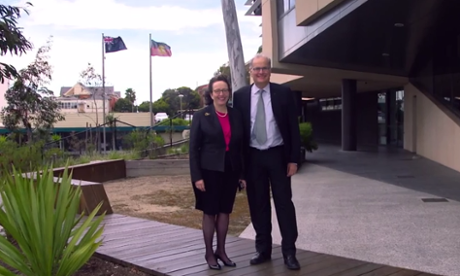Neurologists win $300,000 award for work that has led to better diagnosis and treatments for condition that affects 50 million people worldwide

Sam Berkovic and Ingrid Scheffer have been awarded the $300,000 prime minister’s prize for science for genetic discoveries that have led to better diagnosis and treatments of people with epilepsy.
The two neurology researchers, attached to the University of Melbourne, won the annual prize for helping change the way doctors think about epilepsy, a condition that affects about 50 million people around the world.
Doctors thought epilepsy was a result of head injuries or tumours but Berkovic and Scheffer’s work established that there is a genetic link to many types of epilepsy, with up to 50% of cases now able to be diagnosed with new gene technology.
One particularly aggressive form of epilepsy, which was once thought to be caused by vaccinations, was shown by Berkovic and Scheffer to be triggered by a gene mutation. This discovery is credited with helping ease concerns about the immunisation of children.
The duo’s partnership began in 1991 when Scheffer, who trained as a paediatric neurologist in the UK, came to Australia to have her PhD supervised by Berkovic.
Their work unearthed a large family in South Australia where 27 members suffered from epilepsy. By 1995, Berkovic and Scheffer, with the help of colleagues, were able to trace the problem to a specific chromosome.
Scheffer told Guardian Australia she was “thrilled” by the award and hoped it highlighted the progress made in attitudes towards epilepsy.
“We are trying to decrease its stigma and I think that’s working,” she said. “People used to think it was caused by the devil, so I think community education is very important.
“There are many benefits to a genetic diagnosis. It can inform the choice of therapy because some drugs can make seizures worse. Before this, it was trial and error. It can also inform people of the future risk when it comes to pregnancies.
“The work is very rewarding, not only face-to-face in the clinic with children but also from hearing from parents from around the world.”
Scheffer said she supported the federal government’s idea of a “medical future fund” but said she did not want it funded via a $7 GP co-payment.
“I’d like to see a smarter more innovative way of it being funded,” she said. “A medical future fund is fantastic but we should be careful that it doesn’t affect the future of vulnerable people going to the doctor.”
Scheffer said she was concerned by government funding cuts to science.
“I’d say there is a lot of room to build science in Australia because we are going to lose our smartest young minds,” she said. “I think it would be crazy to throw our smart people away. People get disenchanted because it’s hard to stay in science when you don’t know where your next meal is coming from or how you’re going to pay rent.
“We need the government to invest in science and we need clear career pathways for our young scientists. Not having a science minister is a problem.
“We need to show how exciting and important science is, and how it improves people’s lives.”
Professor Ian Chubb, the chief scientist, said: “Science is awesome and we are too often muted in our recognition of it.
“These awards celebrate excellence, not just in these individuals, but in the national science enterprise that they represent.”
The other prize winners, to be recognised at a function at parliament house on Wednesday night, include CSIRO scientist Matthew Hill who won the physical scientist of the year for his work in creating crystals that can clean up pollution.
Geoff McNamara won the $50,000 science teaching prize for his efforts teaching science at Melrose high school in Canberra while Ben Schiller will also get $50,000 for his work integrating science, play and languages for young children at Seacliff primary school in Adelaide.
